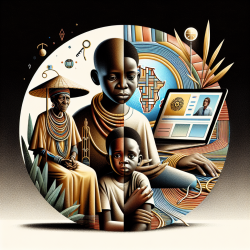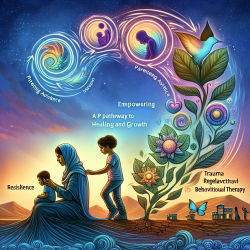Introduction
Child mental health in Sierra Leone is a topic that has garnered increasing attention due to the country's tumultuous history and the recent Ebola epidemic. The study "Child mental health in Sierra Leone: a survey and exploratory qualitative study" provides crucial insights into the challenges and opportunities for developing Child and Adolescent Mental Health (CAMH) services in this post-conflict setting. As practitioners, understanding these findings can enhance our ability to provide effective interventions and encourage further research in this critical area.
The Study's Key Findings
The study highlights several barriers to effective CAMH care in Sierra Leone, including:
- Limited Formal Mental Health Services: The study reveals a staggering treatment gap of over 99.8% for child mental health issues, primarily due to the scarcity of formal mental health services.
- Local Explanations and Stigma: Mental health problems are often attributed to spiritual or supernatural causes, leading families to seek help from traditional healers or religious institutions. This cultural perception is compounded by significant stigma, which affects children, caregivers, and service providers.
- Impact of War and Epidemics: The long-term effects of war and the Ebola epidemic have exacerbated mental health challenges, necessitating a robust response from mental health services.
Recommendations for Practitioners
Practitioners can leverage these findings to improve outcomes for children by:
- Strengthening Legal and Policy Frameworks: Advocating for policies that integrate CAMH into the health system and specifically address the needs of children and adolescents.
- Training and Capacity Building: Providing supplementary CAMH training for professionals across various sectors, including health, education, and social welfare.
- Integrating CAMH into Primary Care: Encouraging the integration of CAMH services into primary health care, education, and social welfare systems to ensure a holistic approach to child mental health.
- Engaging with Traditional Healers: Considering the role of traditional healers in the mental health care system and fostering collaboration where appropriate.
Encouraging Further Research
The study underscores the need for continued research into local explanations of child mental disorders and their impact on well-being. Practitioners are encouraged to explore these cultural dimensions further to develop culturally appropriate interventions that resonate with the local population.
Conclusion
Addressing child mental health in Sierra Leone requires a multifaceted approach that considers cultural perceptions, strengthens legal frameworks, and integrates CAMH into existing systems. By implementing these strategies, practitioners can contribute to improving mental health outcomes for children in Sierra Leone.
To read the original research paper, please follow this link: Child mental health in Sierra Leone: a survey and exploratory qualitative study.










